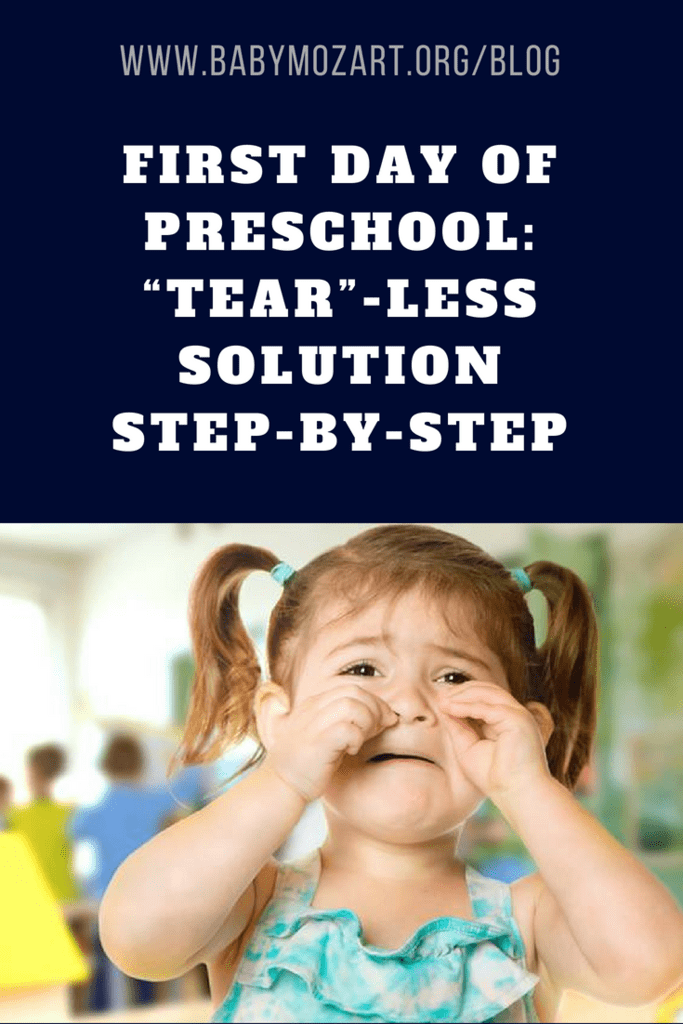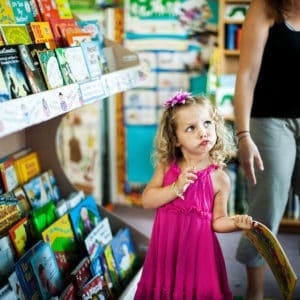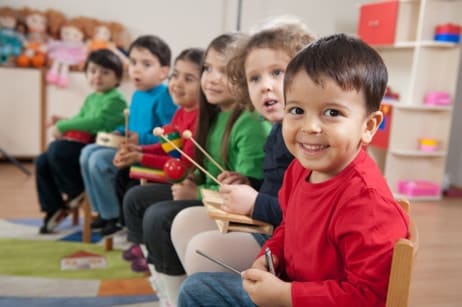
First Day of Preschool – The Tear-Less Solution Step by Step
Starting Preschool
Starting preschool is a big and exciting step for both the child and the parents. To a young child, the first day of preschool can be exciting and scary at the same time. Starting preschool means doing lots of fun activities and becoming a big kid! But on the other hand, it also means separating from parents and being in an unfamiliar setting with new rules and people.
Every child is different, so it is difficult to predict how your child will react to starting preschool, especially on their first day. Luckily, there are proven-to-work steps that you can take to help address his fears and smooth the process as much as possible.
In this blog post, I’m going to share with you all the lessons I learn from sending my son to preschool at a young age of 18 months old. My first tip for starting preschool with fewer tears is: Start preparing your child for preschool EARLY!

Is Your Child Ready for Preschool?
Every child develops at a different pace. Although you have arranged for your child to attend preschool (for my case, 18 months), it doesn’t mean that he is suddenly ready for preschool when he reaches that age.
Preschool readiness is more about where your child is developmentally. Is he ready from a social, emotional, cognitive, and physical standpoint to leave their parents and take part in a classroom setting?
Here’s a quick checklist for you to evaluate if your child is ready for preschool:
- Your child is ok with spending time away from parents or other primary caregivers.
- Your child is independent enough to play by himself for a short period of time.
- Your child can follow simple instructions.
- Your child can focus on one task for several minutes.
- Your child can participate in group activities with other kids, i.e. circle time, story time, play dates, etc.
- Your child shows the ability to take turns. He doesn’t have to do it all the time, but he should understand the concept.
- Your child can express what he wants and needs using words and asks questions.
- Your child can handle basic needs by himself such as washing hands and feeding himself.
- Many preschools for age 3-5 years old require kids to be potty trained; although infant and toddler programs are exempted from this requirement.
If you answer no to some of the questions above, no worries, you still have time to prepare your child for preschool. Simply follow our step-by-step guide for starting preschool below.
During the Summer Before First Day of Preschool
Prepare Your Child as Much as Possible
Summer is the best time to get your child ready for starting preschool in September. If you can get your child comfortable in group settings and away from you, it would be best! Here are some ideas to get your child used to class settings:
- Sign him up for weekly art or dance class, or a weeklong day camp.
- Find out from your community programs if there are classes designed to help children get used to being in the preschool environment.
- If your preschool has a summer program, check with them to see if you can go in for a visit (or 2, or 3) to get your child familiar with the environment and meet future classmates.
Get Organized for The First Day of Preschool
Before school starts, you will likely receive plenty of forms to read and fill out, such as provide your contact information, a list of people to sign your child in and out, immunization records, etc. You should get all those documentation ready and organized in the summer before school starts to prevent any last minute surprises.
You might also want to review the parent handbook and get yourself familiarized with school policies and procedures, classroom schedule, contact information, and what to bring to school on the first day, etc.
It is also a good idea to learn what phase-in procedure is available at your preschool and how the teachers will help your child transition into the new classroom.
Reviewing the school calendar is helpful for future planning. Know when school is closed for holidays, PA days, etc. so you can plan ahead for alternate childcare.
You will also want to figure out drop-off and pickup logistics. Don’t’ forget to allow plenty of time your schedule for the first few weeks so drop-off won’t feel too rushed!
Lastly, don’t forget to enjoy your last summer with your child, whether it’s relaxing at home or going on a family vacation. Once your child starts school, he will have a schedule and it will be harder to plan things spontaneously.
3-4 Weeks Before Preschool Starts
About 3-4 weeks before preschool starts, you can start familiarizing your child with school by talking about the concept of going to school at home. You can also visit the school, read books about school, and sing songs about school.
Talk about School
Talking about preschool before the first day of preschool really helps to get your child used to the idea of going to school and be excited about it. He will pick up from your attitude, so don’t let him sense that you are nervous or anxious or sad. Always be positive when you talk about school, and your child will be positive too! Here are some things you can say:
- In preschool, you get to meet lots of friends your age! How exciting is that!
- Miss Fionna will be your teacher. She is really nice and loves playing with kids!
- In preschool, you will get to play on the slide every day! Wow!
Also, start using some preschool terms around the house, such as snack time, clean up time, etc.
Visit the School
If your preschool allows for visits, try to visit the school a few times a few weeks before school starts so your child can become familiar with the setting. You might want to introduce him to his new teacher and let him play on the school playground.
Books, songs, videos
There are plenty of books, songs, and videos are preschool to help your child understand what a classroom is and how other kids feel about starting school. You can either buy those resources or get from a local library.
Here’s a list of recommended books from Scholastic to prepare your child for the first day of preschool.
1-2 Weeks Before First Day of Preschool
This is the time to get everything your child needs for preschool. Take some time to acknowledge your feelings about the transition and make sure you are prepared for the big day as well!
Count the Days
A good idea is to hang up a calendar and draw a picture of the school around the first day of preschool. Let your child put a sticker on each day, so he can watch the big day getting closer and closer. This will definitely get him excited and make going to school a positive experience.
Establish a New Routine
Kids love routines and feel comfortable when they know what to expect next. If your child doesn’t have a set routine at home, start to create one. You can schedule snack time or playground time at the same time each day. You can even help him get used to making transitions by giving him advance notice when he has to stop doing an activity.
If your child doesn’t have a good sleeping schedule (i.e. sleeps late and wakes up late), start putting him in bed 15 minutes earlier each day until he can get up in time for school. You might want to adjust snack, lunch, and nap times to match the school’s schedule as well.
Shopping!
 Now, this is the fun part – it’s time to go shopping for things your child will need for school! You can bring your child along and have him pick his own supplies! Preschools typically provide a list of items needed, but here are some common items you might want to buy:
Now, this is the fun part – it’s time to go shopping for things your child will need for school! You can bring your child along and have him pick his own supplies! Preschools typically provide a list of items needed, but here are some common items you might want to buy:
- A preschooler-sized backpack that is comfortable and suitable for your child
- Bedding for nap time, i.e blanket, sheet, pillow
- New school clothes that are comfortable, easy to put on (i.e. elastic-waist pants), and durable
- Indoor and outdoor shoes
Label Label Label
Your child’s belongings will be mixed with other kids’ in preschool; so make sure you put a label on everything he will be brining into the classroom with his name or initial. You can simply use a permanent marker or buy specialized labels to stick on.
Learn the Phase-In Plan
Every preschool has a transition plan for new students, called the phase-in plan. Sometimes parents are allowed to stay in the classroom for a designated amount of time on the first day, then a little less time on subsequent days. At some schools, parents are encouraged to stay in the classroom for the first day and participate in a few class activities. Some schools host a classroom open house for children and their parents a day or two before school starts. Whatever the plan is, let your child know what to expect. Talk to him about the new school and make sure he has a positive attitude about school.
If you think your child will have a hard time at drop-off on the first day, try letting the parent he more easily separates from to bring him to school. And for the first couple of weeks, you may want to take a break from other classes or playdates after school so your child can relax at home.
Visit the Classroom & Meet the Teacher
If your preschool allows, be sure to visit the classroom before the first day of preschool. This is a great way for your child to be more comfortable with going to school. When you and child go for the visit:
- Tell your child that this will be his classroom and Ms.Fionna would be his teacher.
- Tour the classroom and point out games and activities he will be doing everyday. Don’t forget about the playground tour!
- Offer him the chance to interact with other kids, but don’t force it.
- Each day leading up to the first day of school, say something like “Next week, you will be going to school and play with Miss. Fionna!”

You should also take time to chat with the teacher(s). This shows your child that you like and trust the teacher, so he feels more comfortable interacting with her as well. If your child has any allergies or medical conditions or fears, make sure you let the teacher know. You might also want to give her some tips on how to handle and comfort your child. Work with the teacher to make the transition as smooth as possible for your child.
Prepare Yourself Emotionally
The beginning of preschool is not only stressful for your little one, it could be a bittersweet experience for parents as well. On one hand, you are happy that your baby is growing up and making new friends, learning new things. But on the other hand, your baby is growing up! He’s no longer YOUR little baby. If you get emotional, don’t feel bad, you are not alone. Many parents go through the same roller coaster feelings. Talk to your friends in the same situation can help, or reach out to other new parents. Trust me, after a few weeks, you will be happy that your child is happy and thriving at preschool.
The Day Before Preschool Starts
It’s tomorrow! Your child is going to be a preschooler tomorrow! As exciting as it is, try to keep the day low-key and relaxing, and do the following:
Remind Your Child
Remind your child in a calm but positive way that preschool starts tomorrow and review the things he will be doing there. At bedtime, remind him again of tomorrow’s routine, make sure he is well aware that there would be changes tomorrow after he wakes up. If your child is worried and anxious about preschool, listen to his concerns and make positive comments to allay his fears. DO NOT dismiss his feelings by saying things like “don’t’ worry” or “don’t be silly”. It’s a big change for your child, be as supportive and empathetic as you can be.
Practice Good-Bye Ritual
Invent a special goodbye ritual with your child and practice it at home. It could be as simple as a hug and kiss, or a high five, or a silly phrase like “See you later, alligator!”. This will make the first day of preschool special!
Get Everything Ready!
Pack up with your child all his school supplies like nap items, change of clothes, and anything else the school requires of you to bring. Let your child help pick his outfit for the big day, and put his things in the backpack. Being involved in this process will make him feel more comfortable in attending preschool.
Relax and Have a Good Night Sleep!
Make sure your child goes to bed early the night before preschool starts to ensure he is well rested and relaxed in the morning. The last thing you want to do is to have a tired, grumpy child attending the first day of school. Set your alarm to wake up early so everyone has lots of time to eat breakfast, prepare, and get out the door on time to arrive at preschool a little early. Allow some buffer time in the morning for your child.
The First Day of Preschool
Today is the big day! You officially have a preschooler at home!
Allow Plenty of Buffers
I can’t stress this enough! Leave plenty of time to get ready and go to school on the first day or days of preschool. The calmer things are at home, the easier the separation will be when you get to school. A good breakfast is a must – a hungry child is a cranky child. It doesn’t have to be big, for kids, simple yogurt, a bran muffin, cereal, and milk would be enough. And lastly, take some time to go over the day’s routine with your child in the morning and on the way to school. This will help relieve some separation anxiety.
Positive and Confident Attitude
Your child can feel how you feel. So if you are anxious, your child’s separation anxiety will skyrocket. Show your preschooler you are confident to leave him at school, and you are so sure it’s going to be great. Let him walk into the classroom on his own instead of carrying him or handing him over to the teacher. Greet the teacher with a confident smile and be friendly to show your child that you too, like the teacher and trust her. And lastly, do your new good-bye ritual!
Some tears are expected in the beginning, but there are some suggestions for getting through those first few tough mornings:
- Remind your child about the fun activities he did the day before and point out other children in the classroom that your child might remember.
- Don’t ask your child permission to leave. When it’s time, just leave.
- Don’t sneak away when your child isn’t looking. Always do the proper good-bye ritual. Leaving without telling your child is very distressing for a young kid.
- Always let your child know you will be back. For younger toddlers, it might be helpful if you say something like “I’ll be back to pick you up after nap” so that they can conceptualize it.
- If your child is clinging to you, try not to make the teacher pull him off your body. Always get your child to walk in the classroom by himself.
- If your child cries, be firm but positive. You could say “It’s really time for me to go. I know it’s hard, but I’m sure you’ll be OK. Miss Fionna will take care of you, I’ll be back after naptime to pick you up!”
- Don’t drag it out by lingering around the classroom door. The longer you stay, the worse it will be.
- If you feel like crying yourself, wait until you are out the door. You don’t want to give your child the wrong impression that school is making mommy sad.
It is definitely tough to leave your little one at preschool at first, especially if he is crying and having a hard time separating. But remember that your child is in a good place, a place you have chosen just for him. If it helps, feel free to call the school later to see how your little one is doing. That could alleviate the emotional stress you might be feeling.
Be On Time for Pickup
This is a general rule, don’t be late to pick up your child from school. Let your child feel confident that you will always come back when you said you would, and don’t let him wonder whether you are coming or not. The worst thing for a child to feel is the last kid left in class.
Be prepared that for the first couple of days, your child might cry when they see you at the door. It doesn’t mean your child has been crying all day; sometimes kids just get emotional after a long day of separating from you. Just ask the teacher. Chances are your child really had a great time. Other kids would happily run into your arms, full of stories about the fun things they do. Some might even refuse to leave because they are not done playing!
After School
Give your child some relaxing time at home to decompress. He might want more individual attentional from you or just want to be left alone. Either way, find a way to celebrate the first day of school with your child – he deserves an ice-cream, so do you!
In a few weeks, the preschool classroom will be full of kids who are happy, having a great time, and your child will be one of them!

Love Baby Mozart?
Follow us on Social Media!
Subscribe today to get exclusive advice on our latest parenting tips, brain development tools, music and songs updates, and much much more! Remember, it's 100% FREE!



It’s good that you brought up how having a positive attitude when dropping your child off at preschool will help them feel the same way. My son will be attending his first day of preschool next year. I’ll make sure to keep an upbeat attitude so that he won’t be anxious.